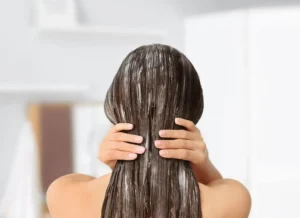Table of Contents
Who Needs a Hair Mask and Why?
If you’ve ever wondered whether a hair mask is beneficial, the answer is a resounding yes! Hair masks aren’t just for damaged or treated hair—they can benefit anyone who wants stronger, shinier, and healthier hair. From those who spend long hours in the sun, to swimmers, and anyone who colors or treats their hair with chemicals, a hair mask can offer an extra layer of protection and nourishment.

Ultimate Guide to Hair Masks: Benefits, DIY Recipes, and Hair Health Tips
Is a Conditioner Enough?
It’s a common misconception that a conditioner can do the same job as a hair mask. While conditioners are good for surface-level moisture, they don’t penetrate as deeply as hair masks, which are formulated to reach the cuticle and strengthen the hair structure from within. Regular use of a hair mask can also help with split ends, an effect that even the best conditioner might not offer.
What is a Hair Mask?
A hair mask is a nutrient-rich treatment designed to nourish and rejuvenate your hair, especially beneficial for those with frequent exposure to environmental stressors or chemical treatments. Hair masks typically contain a blend of ingredients that condition deeply and help repair damage, giving you stronger, more manageable hair.
Benefits of Using a Hair Mask
- Deep Nourishment: Unlike daily conditioners, hair masks are left on longer, allowing beneficial ingredients to penetrate deeper.
- Damage Repair: They help repair split ends and breakage by restoring moisture and resilience.
- Shine and Manageability: Masks add a natural sheen, reducing frizz and tangles.
Understanding Hair Structure
To appreciate the full benefits of hair masks, it’s helpful to understand the structure of hair. Human hair consists of three main layers:
- Cuticle: The outermost layer, formed by overlapping cells that protect the inner layers.
- Cortex: The thickest part, containing proteins and melanin, which give hair its strength and color.
- Medulla: Found in thicker hair, the medulla is the innermost layer, playing a role in overall hair volume.
Common Causes of Hair Damage
Hair damage can occur due to a variety of factors. These include exposure to harsh environmental conditions, frequent chemical treatments, or using products laden with chemicals. Damage manifests as breakage, dryness, frizz, and split ends, which can make hair difficult to manage.
DIY Hair Mask Recipe
If you’re seeking a natural solution for hair health, a DIY hair mask is a cost-effective option that you can easily make at home. Here’s a simple recipe that uses natural ingredients known for their beneficial effects on hair.
Ingredients:
- 2 tbsp coconut oil
- 1 ripe avocado
- 1 egg
- 1 tbsp honey
- 5 drops rosemary essential oil
- 5 drops lavender essential oil
Preparation and Application
Blend the coconut oil and avocado first for a creamy base. Then, add the egg and honey, mixing well. The egg provides protein, while honey is a humectant that locks in moisture. Finally, add the essential oils for their hair growth-promoting properties.
To apply, dampen your hair, distribute the mask evenly, then cover with a shower cap. Leave it on for 45 minutes to an hour, and rinse thoroughly with a natural shampoo. For best results, repeat once a week.
Key Ingredients and Their Benefits
Coconut Oil
Coconut oil is celebrated for its ability to nourish hair with its rich fatty acid content, reducing breakage and improving hair health from the inside out. Studies have shown it penetrates the hair shaft, unlike most other oils.
Avocado
Avocados are a powerhouse of vitamins, especially B and E, which help repair and strengthen hair at the cellular level. It provides deep hydration, especially beneficial for dry or frizzy hair.
Egg
Eggs are loaded with lecithin and protein, essential for strengthening hair and promoting a smooth texture. The sulfur content in eggs may also aid in dandruff reduction.
Honey
Honey is a humectant, attracting moisture from the air to the hair and scalp. Its antioxidants are also beneficial for a healthy scalp, leading to stronger, shinier hair.
Rosemary and Lavender Essential Oils
Rosemary oil has been shown to promote circulation, which can encourage hair growth. Lavender oil, on the other hand, not only provides a pleasant fragrance but may also help reduce hair thinning.
Precautions When Using DIY Hair Masks
While DIY hair masks are safe for most people, some may experience irritation or allergies. It’s wise to patch-test ingredients, especially if you have sensitive skin. Also, avoid getting the mask in your eyes and ensure that your essential oils are of high quality and preferably organic.
Conclusion
Incorporating a hair mask into your hair care routine can transform your hair health, offering benefits that go beyond what conditioners alone can achieve. By understanding the structure of hair and using nutrient-rich ingredients, you can tackle hair issues like frizz, dryness, and split ends, leading to a healthier scalp and more vibrant hair.
For more natural hair care tips, check out Mayo Clinic’s guidelines on hair health or explore WebMD’s recommendations for safe, home-based hair care practices.